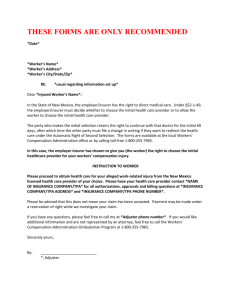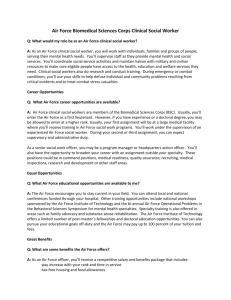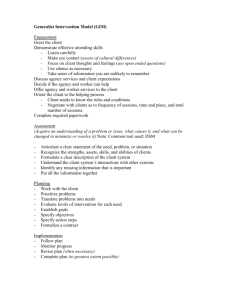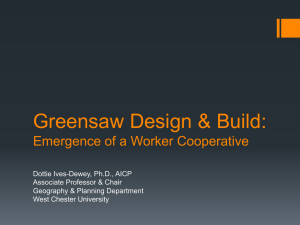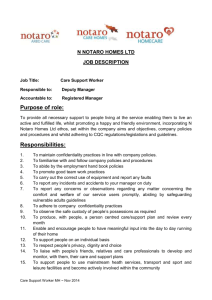Are injuries resulting from assaults during an interval or break from
advertisement
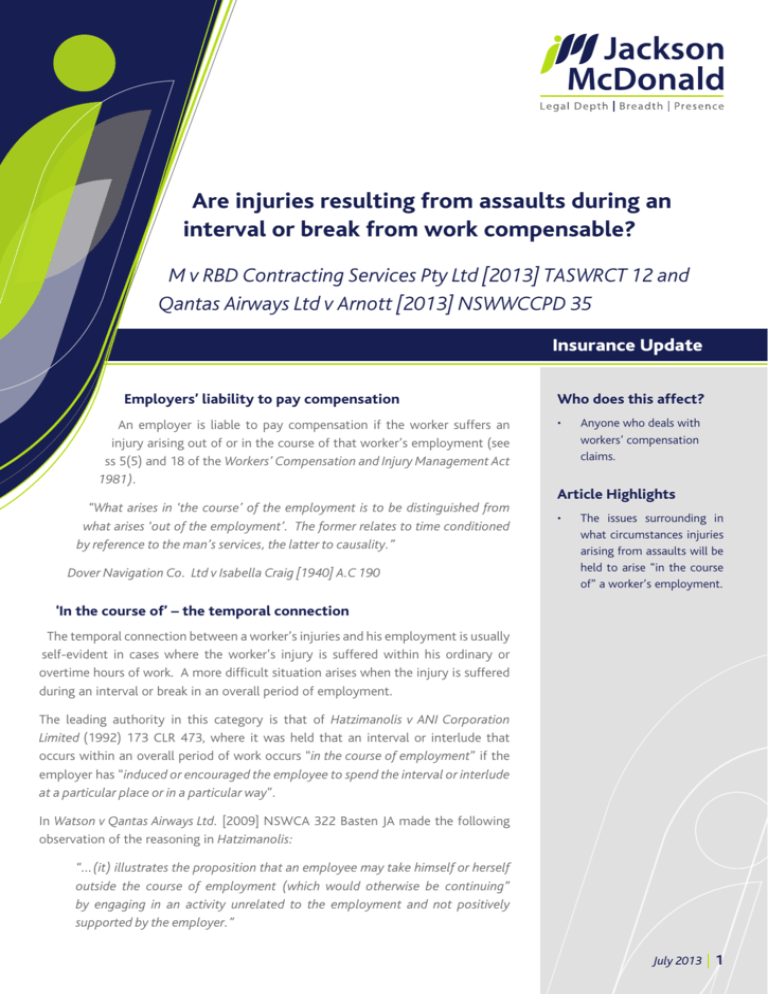
Are injuries resulting from assaults during an interval or break from work compensable? M v RBD Contracting Services Pty Ltd [2013] TASWRCT 12 and Qantas Airways Ltd v Arnott [2013] NSWWCCPD 35 Insurance Update Employers’ liability to pay compensation An employer is liable to pay compensation if the worker suffers an injury arising out of or in the course of that worker’s employment (see ss 5(5) and 18 of the Workers’ Compensation and Injury Management Act 1981). “What arises in ‘the course’ of the employment is to be distinguished from what arises ‘out of the employment’. The former relates to time conditioned by reference to the man’s services, the latter to causality.” Dover Navigation Co. Ltd v Isabella Craig [1940] A.C 190 Who does this affect? • Anyone who deals with workers’ compensation claims. Article Highlights • The issues surrounding in what circumstances injuries arising from assaults will be held to arise “in the course of” a worker’s employment. ‘In the course of’ – the temporal connection The temporal connection between a worker’s injuries and his employment is usually self-evident in cases where the worker’s injury is suffered within his ordinary or overtime hours of work. A more difficult situation arises when the injury is suffered during an interval or break in an overall period of employment. The leading authority in this category is that of Hatzimanolis v ANI Corporation Limited (1992) 173 CLR 473, where it was held that an interval or interlude that occurs within an overall period of work occurs “in the course of employment” if the employer has “induced or encouraged the employee to spend the interval or interlude at a particular place or in a particular way”. In Watson v Qantas Airways Ltd. [2009] NSWCA 322 Basten JA made the following observation of the reasoning in Hatzimanolis: “…(it) illustrates the proposition that an employee may take himself or herself outside the course of employment (which would otherwise be continuing” by engaging in an activity unrelated to the employment and not positively supported by the employer.” July 2013 |1 Insurance Update M v RBD Contracting Services Pty Ltd: the punch-up in the car park! Contact In M v RBD Contracting Services, the worker sustained dental injuries as a result of an altercation with a co-worker. The incident occurred outside of normal work hours, in a car park at a motel. The worker was staying at the motel because the employer had pre-arranged for him to stay there for the entire 10 days that he was required to work on a particular site. The Workers Rehabilitation and Compensation Tribunal (Tasmania) found that by making the hotel arrangements, the employer clearly induced or encouraged the worker to be at the motel and following from that, the intervals or interludes spent by the worker at the motel were within his course of employment. However, Commissioner Chandler went on to note that, consistent with Hatzimanolis, his course of employment did not extend to include activities which the employer had not, either expressly or impliedly induced or encouraged him to engage in. This included acts of gross misconduct. Alex Lustig PARTNER t: +61 8 9426 6733 e:alustig@jacmac.com.au Commissioner Chandler found that the worker’s initiation of the verbal exchange, escalating in a physical altercation, amounted to gross misconduct. He also found that the worker’s behaviour was certainly conduct which the employer had neither induced nor encouraged. The altercation was an activity unrelated to his employment and not supported by the employer. By “participating” in this altercation, the worker took himself outside the course of employment. His injuries were therefore not compensable. Qantas Airways Ltd v Arnott: another punch-up in the car park! In Qantas Airways Ltd v Arnott, the worker was injured as a result of an assault during his “slip time” in Dallas, USA. On the night of the assault, the worker had met with colleagues for dinner and drinks and was assaulted at 2:00am as he walked back to his hotel. Hayley Warren SOLICITOR t: +61 8 9426 6646 e: hwarren@jacmac.com.au The decision was an appeal from an Arbitrator’s decision that: 1. the worker was engaged in an activity which the employer had expressly or implicitly induced or encouraged him to engage in at the time of the assault; and 2. the worker’s employment was a substantial contributing factor to the injury. Judge Keating upheld the Arbitrator’s decision pointing to the following factors to establish this finding: 1. the crew were paid a daily allowance in cash on arrival at the hotel; 2. Qantas accepted that crew would venture away from the slip hotel for the purpose of eating, shopping and recreation; 3. there were no curfews; July 2013 |2 Insurance Update 4. there was no prohibition or limitation on the consumption of alcohol; 5. the injury was sustained while the worker was at a location with the encouragement of his employer; 6. the worker had not been notified that he was required for further work before his scheduled return flight, four days after the assault; and 7. the worker was the victim of an unprovoked assault. There was no indication of any misconduct by the worker due to consumption of a significant quantity of alcohol and no evidence that the consumption of alcohol, or any other action by the worker, contributed to the assault. The worker’s injuries were compensable. What can we learn from these decisions? These cases give further guidance on what considerations a court may look at in determining whether injuries arising from assaults during intervals of work arose in the course of a worker’s employment. The decisions made in these two cases reiterate that the worker’s actions leading up to the assault play a significant role in the court’s determination. If the worker is engaged in activity that was not supported or encouraged by the worker, it may be enough to take him outside the course of his employment, leading to a finding that his injuries are not compensable. Disclaimer: This publication is intended to provide general information only and should not be relied upon as legal advice. If you require legal advice on a matter please contact us. Contact Us t +61 8 9426 6611 f +61 8 9321 2002 e jacmac@jacmac.com.au a Level 25, 140 St Georges Terrace, Perth, Western Australia 6000 GPO Box M971, Perth, Western Australia 6843 w ww . ja c m a c . c o m .au July 2013 |3



